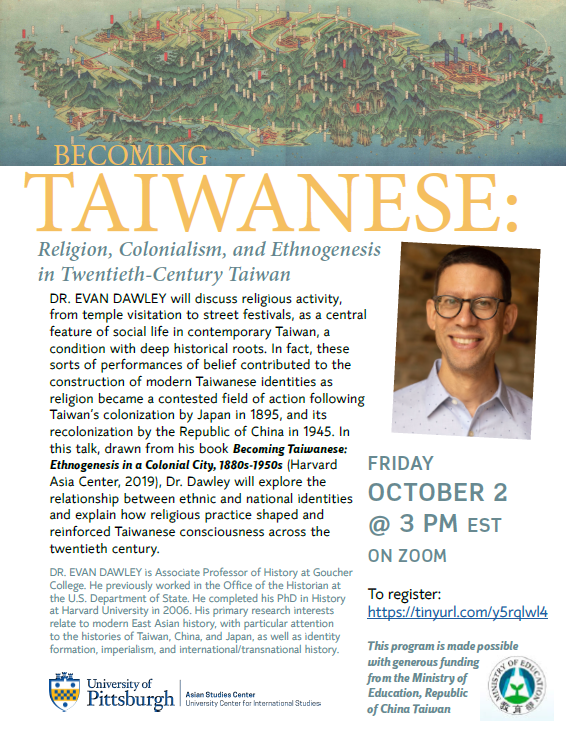The Taiwan Studies program is aimed at examining Taiwan's crucial role in the globalization of modern Asia from historical, cultural, political, economic and socio-developmental perspectives. Since Taiwan’s own development has been shaped by diverse historical and cultural influences, it can be viewed as a microcosm of the forces driving the development of modern Asia. Through the Taiwan Studies program, the ASC plans to host new courses, lectures, seminars, and screenings of Taiwanese films to encourage greater discourse about Taiwan.
The first such seminar was held at the University of Pittsburgh on Oct. 2, with a lecture by history professor Dr. Evan Dawley on the topic “Becoming Taiwanese: Religion, Ethnogenesis, and Colonialism in Twentieth-Century Taiwan.” In his lecture, Dr. Dawley analyzed the formation of a distinct Taiwanese identity, and how this process was influenced by traditional religious practices and the various colonial nations who were present throughout Taiwan’s history. Although the seminar was held virtually due to the COVID-19 pandemic, it was well attended by students and faculty from the university and culminated in a lively Q&A session.
The Asian Studies Center at the University of Pittsburgh was founded in 1969, and has since pioneered the field of East Asian studies in the United States. Its founding faculty included many renowned scholars, including Drs. Hsu Cho-yun, C.K. Yang, and Thomas Rawski. The center has been designated as a Title VI National Resource Center by the U.S. Department of Education to promote the global affairs and foreign language education.
The ASC has planned three major initiatives for its Taiwan Studies program. First, the school will offer two new courses in Taiwan Studies, one of which will be a general education class for undergraduates covering the history of migration to Taiwan, and the other being a specialized course on Taiwan’s history from the 16th century onwards. The second initiative involves incorporating Taiwan Studies into the University of Pittsburgh’s community engagement programs. Specifically, the ASC plans to leverage its existing K-12 teacher training programs by incorporating more Taiwan-related topics into the curriculum. The final component of the program is to host seminars, lectures, and film screenings on topics ranging from Taiwan’s economic development, immigration patterns, to religious practices.


 RSS Feed
RSS Feed